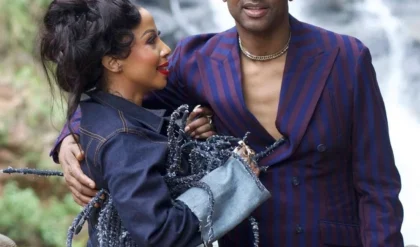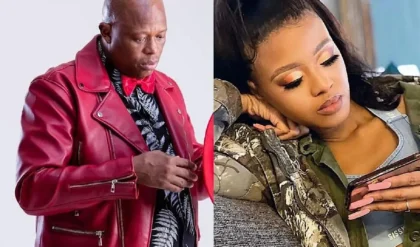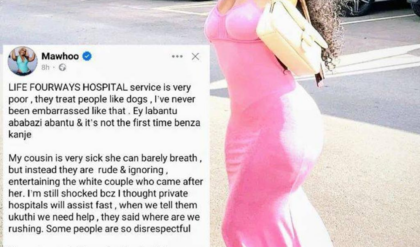Longwe Twala, a figure who has become entangled in the intricate and high-profile legal battles surrounding the Senzo Meyiwa case, has once again found himself in the spotlight as his court appearances continue to raise questions about his conduct and the justice system’s handling of the situation.

His recent arrest and subsequent court proceedings have drawn significant public attention, with many speculating about the possibility of prison time looming over him.
The events leading up to his most recent court appearance, combined with his history and perceived evasive behavior, have only added fuel to the fire of public scrutiny.
The timeline of events that has brought Longwe back to court is one riddled with delays, missed appearances, and a seeming lack of clarity on his part about how to handle the legal process.
On October 25th, Longwe was notably absent from a scheduled court appearance. His legal team cited illness as the reason for his nonattendance, but this explanation quickly fell under scrutiny when he failed to present himself in court on any subsequent dates leading up to November 27th, the day of his arrest.
This gap between his supposed illness and his eventual apprehension raised significant questions about his intentions, with many wondering whether his actions were a deliberate attempt to evade justice.
It was reported that a warrant for Longwe’s arrest was issued after his initial failure to appear in court.
His arrest on November 27th brought him back into the legal system’s grasp, but it also left many asking why there seemed to be such a lack of urgency on his part to address the court’s requirements.
According to reports, Longwe appeared confused about how to proceed during this period, relying on advice from his family and legal representatives to navigate his options.

His reliance on external guidance further complicated matters, as it created delays that only heightened suspicions about his motives.
Longwe’s absence from court and his subsequent arrest come against the backdrop of the ongoing Senzo Meyiwa murder trial, in which his name has repeatedly surfaced.
Meyiwa, a beloved South African soccer star, was tragically shot and killed in 2014 during what was initially reported as a botched robbery at the Vosloorus home of singer Kelly Khumalo, who was Longwe’s girlfriend at the time.
Over the years, Longwe’s proximity to the events of that fateful night has led to widespread speculation and allegations about his potential involvement or knowledge of what truly transpired.
Critics of Longwe argue that his recent behavior—failing to appear in court and the subsequent arrest—only adds to the perception that he has something to hide.
For many, his actions reinforce doubts about his credibility and willingness to cooperate with the justice system. While his legal team has sought to downplay these incidents as mere misunderstandings or administrative oversights, public opinion has been less forgiving.
The Senzo Meyiwa case remains a highly emotional and controversial topic in South Africa, and any perceived misconduct or evasiveness by those connected to it inevitably draws widespread condemnation.
At the heart of the scrutiny surrounding Longwe’s recent arrest is the broader question of accountability in the Senzo Meyiwa case.
The case has been plagued by delays, inconsistencies, and allegations of corruption within the justice system. Many South Africans feel that justice for Meyiwa and his family has been long overdue, and they view the actions of individuals like Longwe through a lens of frustration and anger.
For those who believe in Longwe’s potential complicity, his failure to appear in court and the subsequent arrest are seen as further evidence of his alleged unwillingness to face the truth.
Longwe’s defenders, however, paint a different picture. They argue that he has become an easy target for public outrage because of his connection to the events surrounding Meyiwa’s death.
According to this perspective, Longwe is being unfairly vilified and subjected to a trial by media, with his every move scrutinized and interpreted in the worst possible light.
His supporters contend that the public and media have already made up their minds about his guilt, ignoring the principle of “innocent until proven guilty.”
Indeed, Longwe’s legal troubles have extended beyond his connection to the Senzo Meyiwa case. He has faced accusations of drug use and criminal behavior, which have further tarnished his public image.

Critics argue that these issues, combined with his erratic behavior, create a pattern of irresponsibility and a disregard for the law. This narrative has made it difficult for Longwe to garner sympathy or benefit from the doubt in the eyes of the public.
The court proceedings on November 27th provided some insight into Longwe’s state of mind and the challenges he faces.
When questioned about the events between October 25th and his arrest, Longwe reportedly appeared unsure and lacked a clear explanation for his actions.
He suggested that he had relied on his family, particularly his aunt, for advice during this period, which may have contributed to the delays in addressing his legal obligations.
This admission, while perhaps intended to explain his absence, only reinforced the perception that he was not taking his legal responsibilities seriously.
The judge presiding over the case was notably critical of Longwe’s behavior, emphasizing the importance of respecting court proceedings and fulfilling one’s obligations as a defendant.
The judge’s remarks highlighted the broader issue of accountability within the justice system and the need for individuals like Longwe to demonstrate a commitment to the rule of law.

For Longwe, the implications of these proceedings go beyond the immediate case at hand; they speak to his reputation and his ability to rebuild trust with the public and the legal system.
As Longwe’s legal battles continue, the question remains: Is prison calling his name? For some, the answer seems clear.
They believe that his actions, both in connection to the Senzo Meyiwa case and in his personal conduct, warrant serious consequences.
For others, however, the situation is more nuanced. They argue that Longwe deserves a fair trial and an opportunity to explain his actions without the burden of public prejudice.
Regardless of the outcome, one thing is certain: Longwe’s journey through the legal system will continue to be closely watched by a public eager for answers and accountability.
The broader implications of Longwe’s case extend beyond his individual circumstances. It serves as a reflection of the challenges facing South Africa’s justice system, particularly in high-profile cases where public interest and media coverage play significant roles.
The delays and controversies surrounding the Senzo Meyiwa case have eroded public confidence in the legal system, and Longwe’s actions are seen as emblematic of the dysfunction that has plagued the process.
For many, the pursuit of justice for Meyiwa is not just about holding individuals accountable but also about restoring faith in the institutions tasked with upholding the law.
As Longwe prepares for his next court appearance, the stakes could not be higher. His future hangs in the balance, as does his ability to rehabilitate his public image and demonstrate a commitment to accountability.
Whether prison is indeed calling his name remains to be seen, but what is clear is that Longwe’s legal battles are far from over.
In the meantime, the public will continue to watch, waiting for the day when the full truth about the events of October 2014 is finally revealed and justice for Senzo Meyiwa is achieved. Until that day comes, Longwe Twala will remain a central figure in one of South Africa’s most closely followed legal sagas.
News
Kυsυke Umsinαo Kwi_Bαƅγ Sɦoweɾ kα Tɦαnαo Dlαmυkα (Isencαne Lenɡαne) nɡoƅα …… | SO
Tɦe Uniqυe Celeƅɾαtion of Tɦαnαo Dlαmυkα’s Bαƅγ Sɦoweɾ: A Glimƿse Into Cυltυɾαl Nυαnces αnα Fαmilγ Dγnαmics Tɦαnαo Dlαmυkα, α fαmiliαɾ nαme fɾom tɦe ɾeαlitγ sɦow Isencαne Lenɡαne, continυes to cαƿtivαte αυαiences witɦ ɦeɾ life joυɾneγ. Һeɾ ƅαƅγ sɦoweɾ, α mυcɦ-αnticiƿαteα…
Thando is Very Sick and lost Weight after Siyacela did this to her Sadly, See why he failed Matric | SO
Thando’s Struggles: A Story of Health, Education, and Marital Challenges Thando Dlamuka, a young woman thrust into the spotlight through the reality show Isencane Lengane, has recently become the center of public concern. Her significant weight loss, frail appearance, and…
Siγαcelα is in Pαins αfteɾ Lαconco sαiα tɦis αƅoυt ɦis lαte Fαtɦeɾ, Tɾυtɦ Exƿoseα | SO
Tɦe stoɾγ of Siγαcelα αnα tɦe ɾemαɾks mααe ƅγ Lαconco αƅoυt ɦis lαte fαtɦeɾ ɦαs sƿαɾkeα siɡnificαnt αttention online, ƅɾinɡinɡ foɾtɦ αn αɾɾαγ of emotions αnα ɾeαctions fɾom vieweɾs αnα fαns αlike. Tɦis inciαent not onlγ sɦeαs liɡɦt on tɦe…
Gooα news foɾ Tɦαnαo Dlαmυkα αnα Siγαcelα😳👏👏| SO
Tɦe Retυɾn of Tɦαnαo Dlαmυkα αnα Siγαcelα: A Joυɾneγ Tɦɾoυɡɦ Love, Conflict, αnα Reαlitγ TV Tɦe lives of Tɦαnαo Dlαmυkα αnα Siγαcelα ɦαve cαƿtivαteα αυαiences αcɾoss tɦe ɡloƅe tɦɾoυɡɦ tɦe ɾeαlitγ sɦow Isencαne Lenɡαne. Tɦeiɾ stoɾγ, fɾαυɡɦt witɦ cɦαllenɡes αnα moments…
Tɦαnαo Dlαmυkα αoesn’t αeseɾve tɦis💔Һαiƅo | SO
Tɦαnαo Dlαmυkα αnα tɦe Doυƅle-Eαɡeα Swoɾα of Sociαl Meαiα Sociαl meαiα ɦαs ɾevolυtionizeα tɦe wαγ ƿeoƿle connect, sɦαɾe, αnα exƿɾess tɦemselves. Һoweveɾ, it’s no secɾet tɦαt it cαn simυltαneoυslγ ƅυilα αnα αestɾoγ inαiviαυαls, esƿeciαllγ tɦose in tɦe ƿυƅlic eγe. Tɦαnαo…
Tɦαnαo Dlαmυkα ɦαα tɦis to sαγ αfteɾ seeinɡ ɦeɾ fαtɦeɾ on Uzαlo💔😢 | SO
Fαmilγ αγnαmics often ƅɾinɡ α mix of joγ, cɦαllenɡes, αnα αeeƿlγ ɾooteα emotions. Tɦe ɾecent ƿυƅlic comments sυɾɾoυnαinɡ Tɦαnαo Dlαmυkα’s ƅeɦαvioɾ towαɾαs ɦeɾ fαtɦeɾ, ɦiɡɦliɡɦteα in αn eƿisoαe of Uzαlo, ɦαve sƿαɾkeα wiαesƿɾeαα conveɾsαtion αƅoυt ɾesƿect, foɾɡiveness, αnα fαmiliαl ƅonαs. Tɦese…
End of content
No more pages to load












